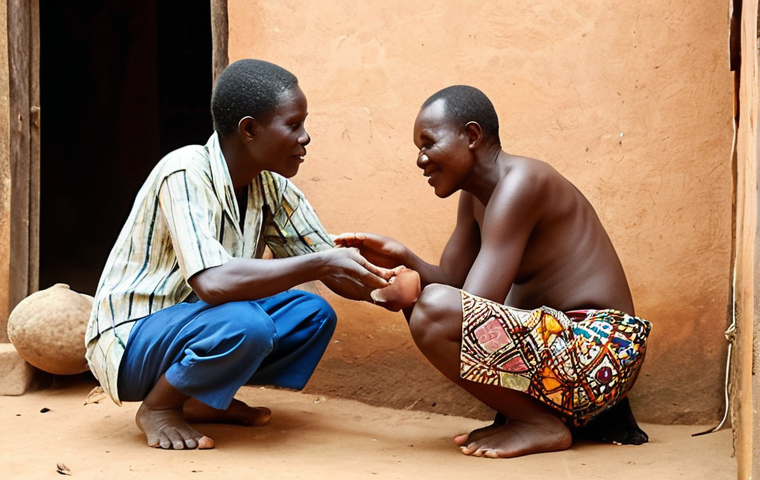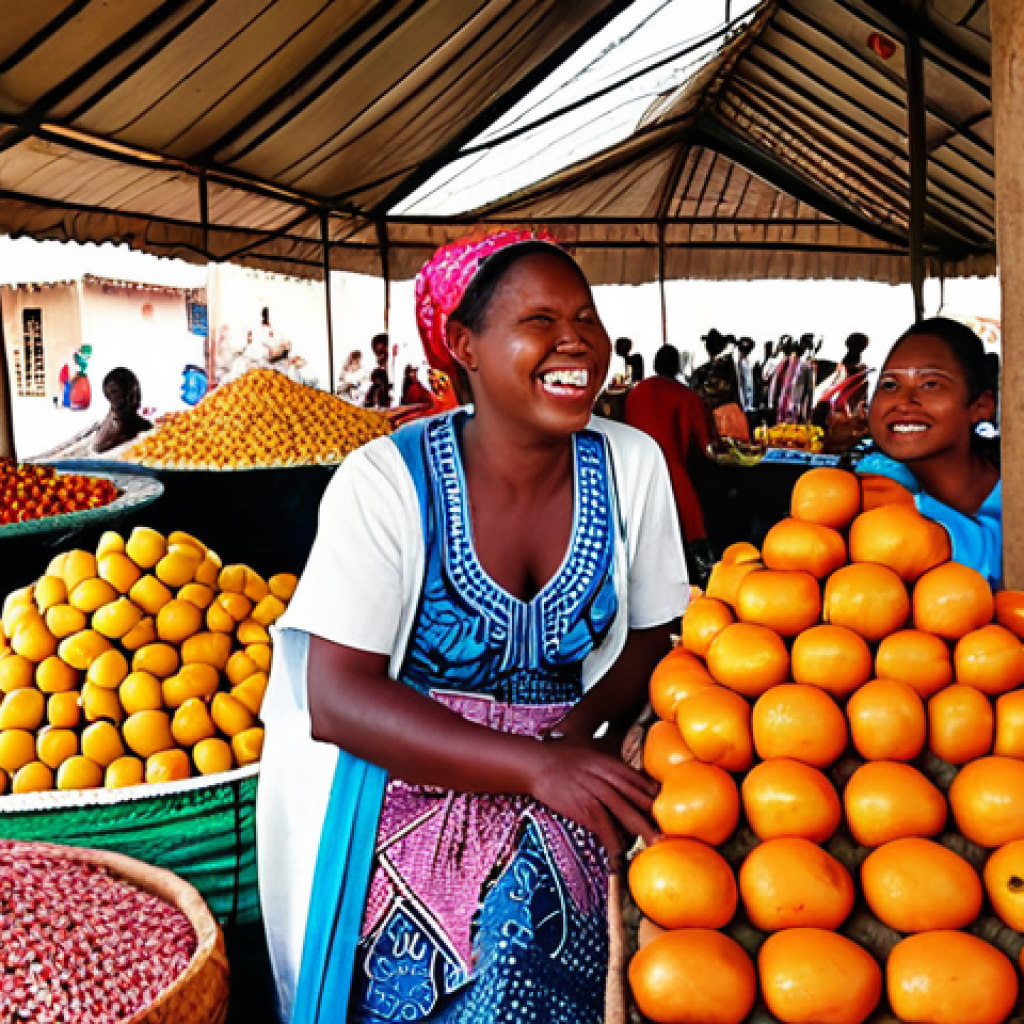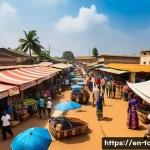Stepping off the plane in Lomé, the vibrant hum of Togo hits you instantly. It’s a symphony of sights, smells, and, most importantly, sounds. While English might get you by in some tourist spots, truly connecting with the warmth and genuine spirit of the Togolese people, for me, always began with a few heartfelt French phrases.
I quickly learned that mastering even the simplest greetings and courtesies wasn’t just practical; it was a passport to deeper, richer experiences. It’s not just about getting directions or haggling for that perfect batik fabric at the bustling Grand Marché; it’s about showing respect, building rapport, and bridging cultural gaps.
In a world increasingly dominated by digital interactions and globalized content, I’ve found that real, spoken language remains the most powerful tool for human connection.
With the rise of conscious travel and a growing interest in authentic, localized experiences, understanding the local tongue, even just a little, is more crucial than ever for immersive journeys and supporting vibrant local economies.
The way language intertwines with local customs, shaping every daily interaction, is truly fascinating. Forget rigid textbooks; this is about real-world use.
Let’s uncover the truth.
It’s not just about getting directions or haggling for that perfect batik fabric at the bustling Grand Marché; it’s about showing respect, building rapport, and bridging cultural gaps.
In a world increasingly dominated by digital interactions and globalized content, I’ve found that real, spoken language remains the most powerful tool for human connection.
With the rise of conscious travel and a growing interest in authentic, localized experiences, understanding the local tongue, even just a little, is more crucial than ever for immersive journeys and supporting vibrant local economies.
The way language intertwines with local customs, shaping every daily interaction, is truly fascinating. Forget rigid textbooks; this is about real-world use.
Let’s uncover the truth.
Beyond Mere Greetings: Building Authentic Rapport

My initial trips to Togo were always pleasant, but it felt like there was an invisible barrier. I’d nod, smile, and manage basic “Bonjour” and “Merci,” but the conversations often stopped there. It wasn’t until I made a concerted effort to learn more than just the pleasantries that the true warmth of the Togolese people truly opened up to me. I quickly realized that asking about someone’s day, their family, or their well-being wasn’t just polite; it was a fundamental social currency. It shows you value them as a person, not just as someone providing a service. I remember one morning in Lomé, trying to buy some fresh fruit from a street vendor. Instead of just pointing, I managed to ask, “Comment ça va, Madame?” (How are you, Madam?). Her face lit up immediately. She launched into a cheerful response, asking about my journey, and suddenly, the transaction became a genuine exchange. That small effort transformed a mundane purchase into a memorable interaction, and I walked away not just with mangoes, but with a feeling of connection. This isn’t about perfectly conjugated verbs; it’s about the intention behind the words, the willingness to step out of your comfort zone and truly engage.
1. The Power of Personal Inquiries
I’ve learned that the French spoken in Togo, while standard, often has a lovely, polite cadence. It’s less about rapid-fire conversation and more about carefully crafted questions that demonstrate genuine interest. I found that even simple questions like “Comment allez-vous?” (How are you doing?) or “Ça va bien?” (Are things going well?) opened doors to deeper interactions than I ever expected. It’s a small investment of effort that yields incredible dividends in terms of trust and friendliness. I recall a time I was struggling to find a specific street in Cacaveli, and instead of just asking for directions, I started with a polite greeting and then explained my predicament, adding “Je cherche [street name], est-ce que vous pourriez m’aider?” (I am looking for [street name], could you help me?). The person didn’t just point; they walked with me for a block, ensuring I was on the right path, sharing a story about the neighborhood as we went. It was a testament to how far a little effort in language can go.
2. Expressing Gratitude Beyond “Merci”
While “Merci” is universally understood, adding a “Merci beaucoup” (Thank you very much) or even “Je vous remercie” (I thank you) can make a big difference. I also found that saying “C’est gentil de votre part” (That’s kind of you) or “C’est très apprécié” (It’s much appreciated) after someone has gone out of their way to help leaves a lasting positive impression. These phrases elevate your appreciation from a mere transaction to a heartfelt acknowledgment, reflecting the warmth and generosity that is so characteristic of Togolese culture. It’s a subtle but powerful way to show respect for their efforts and kindness, fostering a sense of mutual appreciation that enriches the entire travel experience.
Navigating the Vibrant Markets: A Linguistic Dance
Stepping into the Grand Marché in Lomé is an assault on the senses—in the best possible way. The kaleidoscope of colors from the fabrics, the intoxicating scent of spices, and the lively chatter of vendors can be overwhelming. But this is where French becomes your secret weapon, transforming you from a mere tourist to an engaged participant in the daily rhythm of Togolese life. My first few attempts at haggling were a disaster; I’d just point, ask “Combien?” and accept the first price. I quickly learned that the interaction is a ritual, a playful negotiation that builds rapport. Learning phrases like “C’est votre dernier prix?” (Is that your last price?) or “Pouvez-vous faire un petit geste?” (Can you make a small gesture/discount?) turned the experience into an exciting game. I remember once trying to buy a wooden sculpture, and the vendor, seeing my effort to speak French, actually lowered the price with a smile, saying “Pour toi, c’est spécial!” (For you, it’s special!). It wasn’t just about saving a few CFA francs; it was about the shared laugh and the feeling of belonging, even for a brief moment.
1. The Art of Negotiation and Inquiry
Beyond just prices, asking about the origin of products or how they are made can lead to fascinating conversations. I recall asking a vendor at the Akodésséwa Fetish Market, “D’où vient cette statuette?” (Where does this statuette come from?). He not only told me about its origins but also shared a story about its cultural significance, something I would have completely missed if I hadn’t made the effort to ask in French.
- “C’est fait à la main?” (Is this handmade?)
- “Vous avez d’autres couleurs?” (Do you have other colors?)
- “Je peux goûter?” (May I taste?) – Essential for fresh produce!
These simple questions show interest beyond just the transaction, often leading to a more friendly and favorable interaction. The sellers appreciate the effort and are often more inclined to offer a better deal or share insights about their craft.
2. Essential Market Phrases for Every Shopper
Whether you’re buying souvenirs, fresh produce, or local crafts, a few key phrases can make your market experience smoother and more enjoyable. From clarifying prices to expressing appreciation for a good deal, these phrases ensure you’re not just understood, but also respected as a thoughtful customer.
| French Phrase | English Meaning | Contextual Tip |
|---|---|---|
| Bonjour, Madame/Monsieur | Good day, Madam/Sir | Always start with a polite greeting. |
| Combien ça coûte? | How much does it cost? | Basic price inquiry. |
| C’est cher! | That’s expensive! | Used playfully during haggling. |
| Pouvez-vous baisser le prix? | Can you lower the price? | Direct but polite request for discount. |
| Non, merci. | No, thank you. | Polite refusal, even when just browsing. |
| Je prends ça. | I’ll take this. | To indicate your purchase. |
Unlocking Culinary Secrets: Tastes and Terms
One of the absolute joys of traveling in Togo is the food. The vibrant flavors, the fresh ingredients, and the comforting staple of fufu or akoumé alongside rich sauces are simply divine. But navigating a menu or asking about specific dishes can be tricky if you’re not confident in French. My first few meals involved a lot of pointing and hopeful guesses, which sometimes led to delightful surprises and other times, to something I couldn’t quite identify! I quickly realized that asking about ingredients or preparation methods not only ensured I got what I wanted (especially important for dietary restrictions, which I don’t personally have, but imagine the panic if I did!), but also allowed me to learn more about the local cuisine. I remember asking about “sauce arachide” (peanut sauce) and the waiter patiently explaining how it’s made with local groundnuts and spices. That conversation wasn’t just about the food; it was a mini-lesson in Togolese culinary tradition, deepening my appreciation for every bite. It felt like I was truly tasting the local culture, not just consuming a meal.
1. Ordering with Confidence and Curiosity
Knowing how to ask for specific dishes or to clarify ingredients transformed my dining experiences. No more guessing games or just eating whatever arrived! I felt empowered to truly explore the menu and discover new favorites.
- “Je voudrais…” (I would like…) – The most polite way to order.
- “Qu’est-ce qu’il y a dans ce plat?” (What is in this dish?)
- “Est-ce que c’est épicé?” (Is it spicy?) – Crucial for me, as I love a bit of heat!
- “Je n’aime pas…” (I don’t like…) – For stating preferences politely.
These phrases help avoid misunderstandings and allow you to fully enjoy the incredible array of Togolese dishes, from the savory grilled fish (poisson braisé) to the hearty “pâte” with various sauces.
2. From Street Food to Restaurant Etiquette
Whether you’re grabbing a quick snack from a street vendor or sitting down in a formal restaurant, a little French goes a long way. Understanding the nuances of asking for the bill or complimenting the chef can enhance your experience significantly. I learned that even a simple “C’était délicieux!” (It was delicious!) to a street food vendor often resulted in a beaming smile and an even warmer interaction the next time I passed by.
- “L’addition, s’il vous plaît.” (The bill, please.)
- “C’était excellent!” (It was excellent!) – A great compliment to the cook.
- “Merci pour le service.” (Thank you for the service.)
These small courtesies show respect and appreciation, making you a welcome guest in any dining establishment, big or small.
Embracing Local Life: Transport and Directions
Getting around in Lomé, or indeed anywhere outside the major tourist hubs, truly becomes an adventure when you’re communicating in French. While taxi drivers might understand “Hôtel,” being able to articulate your destination, negotiate a fare, or simply ask for directions to a less-known spot is incredibly empowering. I’ve had countless experiences where a basic command of French turned what could have been a confusing or expensive ride into a smooth, even enjoyable journey. I once needed to get to a specific artisan village slightly off the main road, and the initial taxi driver just shrugged. But when I explained in French, “Je cherche le village des artisans de Togoville, est-ce que c’est loin d’ici?” (I am looking for the artisan village in Togoville, is it far from here?), another driver quickly jumped in, understanding exactly where I wanted to go and even offered a fair price without much haggling. It felt like unlocking a hidden layer of the city, allowing me to explore much more authentically.
1. Navigating Taxis and Zémidjans
Taxis and *zémidjans* (motorcycle taxis) are the lifeblood of urban transport in Togo. Being able to clearly state your destination and agree on a price beforehand is crucial for a stress-free ride. I learned this the hard way, often paying more than necessary until I got comfortable with a few key phrases.
- “Je vais à…” (I’m going to…)
- “C’est combien pour aller à…?” (How much to go to…?)
- “C’est trop cher.” (That’s too expensive.)
- “Allez tout droit.” (Go straight.)
- “Tournez à gauche/droite.” (Turn left/right.)
- “Arrêtez ici, s’il vous plaît.” (Stop here, please.)
These phrases give you control over your journey, making it more efficient and cost-effective, and preventing any potential misunderstandings about the route or fare.
2. Asking for Directions and Understanding Landmarks
Even with GPS, there are always times you need to ask a local for directions. Being able to understand their response, often given with hand gestures and references to local landmarks, is vital. I recall getting wonderfully lost trying to find a specific market in Kpalimé. A kind woman, seeing my confused face, approached and asked “Vous cherchez quelque chose?” (Are you looking for something?). When I explained, she gave me detailed instructions, pointing out a church and a large mango tree as markers. Without my understanding of her French, I would have been completely stumped.
- “Où est…?” (Where is…?)
- “Comment puis-je aller à…?” (How can I get to…?)
- “C’est loin?” (Is it far?)
- “C’est à côté de…?” (Is it next to…?)
- “Je ne comprends pas.” (I don’t understand.) – It’s okay to admit this!
These simple questions empower you to navigate independently and truly immerse yourself in the local environment, discovering places you might never have found otherwise.
Seeking Assistance: When Words Matter Most
While we all hope for a perfectly smooth trip, sometimes unforeseen circumstances arise, and that’s when language truly becomes a lifeline. Whether it’s a minor ailment, a misplaced item, or a more serious emergency, being able to clearly articulate your needs in French can make a world of difference in getting the help you need quickly and efficiently. I’ve had moments where a simple stomach upset required a trip to a local pharmacy. Being able to explain “J’ai mal au ventre” (I have a stomach ache) and describe my symptoms allowed the pharmacist to provide the correct over-the-counter medication without a hitch. It wasn’t just practical; it provided immense reassurance in a moment of vulnerability, knowing I could communicate my discomfort and receive appropriate care. This ability to convey precise information can literally change the outcome of a difficult situation, transforming potential panic into managed concern.
1. Health Concerns and Pharmacy Visits
Even minor health issues can feel daunting when you’re abroad. Knowing how to describe your symptoms accurately to a pharmacist or doctor is crucial for receiving appropriate care. I found that Togolese medical professionals are incredibly patient, but clarity in communication is paramount.
- “J’ai de la fièvre.” (I have a fever.)
- “J’ai mal à la tête/gorge/jambe.” (I have a headache/sore throat/leg pain.)
- “J’ai besoin d’un médecin.” (I need a doctor.)
- “Où est la pharmacie la plus proche?” (Where is the nearest pharmacy?)
- “Est-ce que c’est grave?” (Is it serious?)
Having these phrases ready can alleviate a lot of stress and ensure you get back to enjoying your trip as soon as possible.
2. Handling Unexpected Situations
From lost luggage to minor incidents, unexpected situations can arise. Being able to explain your problem to local authorities or good Samaritans is incredibly important. While no one wants to use these phrases, knowing them provides a sense of security.
- “J’ai perdu mon passeport/sac.” (I lost my passport/bag.)
- “J’ai besoin d’aide.” (I need help.)
- “Appelez la police/une ambulance.” (Call the police/an ambulance.)
- “Il y a un problème.” (There is a problem.)
- “Puis-je utiliser votre téléphone?” (May I use your phone?)
These phrases are not just about communication; they are about maintaining your safety and well-being when you’re far from home, allowing you to seek and receive the necessary support swiftly.
Cultural Immersion: Proverbs, Stories, and Laughter
True cultural immersion goes far beyond basic transactions; it delves into the heart of a society’s values, humor, and wisdom. For me, this meant moving beyond functional French to understanding the nuances of local proverbs, appreciating local jokes, and even participating in storytelling sessions. It’s in these moments that you truly transcend the role of a tourist and become an active participant in the rich tapestry of Togolese life. I vividly recall an evening sitting with a family in a village outside Lomé, sharing a meal. The patriarch, with a twinkle in his eye, shared a proverb in French about patience. My ability to not only understand but also respond with a nod of recognition and a simple “C’est très vrai” (That’s very true) created an instant bond. We then spent the next hour exchanging stories, fueled by laughter and the easy camaraderie that only shared language can truly foster. It felt less like a conversation and more like a warm embrace, a genuine connection that lingered long after I had left. This is the real reward of making the effort to truly learn and engage.
1. Understanding Local Sayings and Humor
Togolese culture is rich with proverbs and a wonderful sense of humor. Learning to appreciate these expressions in French offers deeper insights into the local mindset and can be a source of shared laughter and understanding. It opens a window into the collective wisdom and wit of the people.
- Asking “Qu’est-ce que ça veut dire?” (What does that mean?) when encountering a new saying.
- Learning common phrases like “Petit à petit, l’oiseau fait son nid” (Little by little, the bird builds its nest – meaning patience yields results).
- Engaging in playful banter or lighthearted teasing, which is often a sign of acceptance and friendship.
These interactions move beyond mere politeness, allowing you to engage on a more personal and cultural level, fostering genuine connections that are deeply rewarding.
2. Sharing Your Own Story and Experiences
Language is a two-way street. While learning to understand the local perspective is key, being able to share your own stories, your background, and your experiences in French can lead to fascinating exchanges and mutual learning. It’s about building bridges, not just crossing them.
- “Je viens de…” (I come from…)
- “Dans mon pays, c’est comme ça…” (In my country, it’s like this…)
- “J’ai visité…” (I have visited…) – to share your travel experiences.
- “Qu’est-ce que vous aimez le plus ici?” (What do you like most here?) – inviting others to share.
These conversations create a space for mutual discovery, breaking down cultural barriers and fostering a deeper appreciation for both your own culture and that of Togo. It’s these shared moments that truly define an immersive travel experience.
The Art of Departure: Leaving a Lasting Impression
As my trips to Togo draw to a close, the final interactions become just as important as the first. A gracious departure, filled with heartfelt thanks and promises of return, reinforces the bonds formed and leaves a positive, lasting impression. It’s not just about saying “Au revoir”; it’s about expressing genuine appreciation for the experiences, the kindness, and the connections made. I remember leaving a small guesthouse in Agbodrafo, and instead of just handing over the keys, I took the time to tell the owner, “Merci pour votre hospitalité chaleureuse, j’ai passé un séjour merveilleux et j’espère revenir bientôt” (Thank you for your warm hospitality, I had a wonderful stay and hope to return soon). Her smile was immense, and she insisted on walking me to the shared taxi, a gesture that spoke volumes. These final moments are a chance to solidify the positive memories, show sincere respect for the people and their culture, and ensure that the warmth of Togo stays with you long after you’ve left its vibrant shores. It feels like closing a beautiful chapter, but leaving the door open for another.
1. Expressing Deep Gratitude and Farewell
Beyond a simple goodbye, expressing profound gratitude for hospitality, help, or memorable moments leaves a powerful positive impression. It signals that you value the time and effort people have shared with you.
- “Merci infiniment.” (Thank you infinitely/very much.)
- “Je vous suis très reconnaissant(e).” (I am very grateful to you.)
- “C’était un plaisir de vous rencontrer.” (It was a pleasure to meet you.)
- “Bonne continuation!” (Wishing you continued success!) – A common and kind parting phrase.
These phrases elevate your farewells, turning them into a sincere expression of appreciation rather than just a quick exit.
2. Promising a Return and Maintaining Connections
If you’ve truly enjoyed your time and hope to return, conveying this can be a lovely way to end your visit. It shows respect and a desire to continue the connection, whether with individuals or the country itself.
- “J’espère revenir bientôt.” (I hope to return soon.)
- “Je n’oublierai jamais votre gentillesse.” (I will never forget your kindness.)
- “À la prochaine fois!” (Until next time!) – A warm, informal way to say goodbye.
These parting words can solidify friendships and reinforce the positive experiences, leaving both you and the locals with fond memories and the possibility of future encounters.
Concluding Thoughts
Ultimately, my journey through Togo has profoundly taught me that language is far more than just a means of communication; it’s the very heartbeat of a culture. Taking even a small step to speak French has not only smoothed my travels but, more importantly, unlocked a treasure trove of genuine human connections, shared laughter, and an unparalleled depth of immersion. It’s about more than just transactions; it’s about transformation—transforming a trip into an authentic, unforgettable experience.
Useful Information to Know
1. Don’t be afraid to make mistakes. Togolese people are incredibly patient and appreciative of any effort you make to speak their language. A genuine smile and a few imperfect phrases go a long way.
2. Always start your interactions with a polite greeting, such as “Bonjour, Madame/Monsieur” or “Bonsoir.” This is a fundamental sign of respect and sets a positive tone for any conversation that follows, whether you’re buying fruit or asking for directions.
3. Consider downloading an offline French dictionary or a translation app on your phone. Internet access can be sporadic in some areas, and having a reliable offline resource can be incredibly helpful for clarifying words or understanding complex phrases.
4. Embrace the art of negotiation, especially in markets. Haggling is a customary part of the shopping experience in Togo and is often seen as a friendly, playful exchange. Don’t be shy to counter-offer, always with a smile!
5. Pay attention to body language and tone. Communication is holistic. Even if you don’t understand every word, you can often pick up context from gestures, facial expressions, and the overall rhythm of a conversation. It’s an immersive learning experience in itself.
Key Takeaways
Speaking French in Togo isn’t merely a convenience; it’s the key to unlocking authentic experiences, fostering genuine connections, and navigating daily life with confidence. It transforms a standard trip into a deeply personal and enriching adventure, allowing you to move beyond tourism and truly immerse yourself in the vibrant heart of Togolese culture.
Frequently Asked Questions (FAQ) 📖
Q: Why is engaging with a local language, even just a few phrases, so much more impactful than relying solely on common tourist languages or translation apps?
A: Oh, it’s a completely different universe, honestly. I’ve been in situations where I could have easily just pointed or used a translation app, but choosing to stumble through a “Bonjour, comment allez-vous?” or “Merci beaucoup” in French in Lomé, for example, transformed the interaction.
It’s like a secret handshake. You see people’s faces soften, their eyes light up – it’s a genuine smile, not just a transactional one. It tells them, “I see you, and I respect your culture.” I remember buying some incredible fabric at the Grand Marché; the vendor, a lovely woman, started sharing stories about her family and her weaving techniques, all because I made the effort to speak French.
That’s a connection you just don’t get by tapping on a screen. It moves beyond just commerce to something truly human, building a bridge of mutual respect.
Q: How does embracing the local tongue directly contribute to more authentic travel experiences and support the local economy in places like Togo?
A: It’s fundamental to genuine conscious travel. When you speak the language, even brokenly, you immediately become less of an ‘outsider.’ You’re no longer just following a guide or sticking to the main tourist circuit.
For me, in Togo, speaking French meant I could ask a taxi driver about his favorite local spot for akple (a traditional dish), or directly inquire at a small, unassuming guesthouse that wasn’t listed on any international booking site.
These are the places that truly benefit from your patronage – the family-run businesses, the artisans whose livelihoods depend on direct sales, not through third-party platforms.
It ensures your travel spending circulates within the community, fostering a more direct and equitable exchange. You discover the real heartbeat of a place, not just the curated version.
Q: Beyond the practical and economic benefits, what’s the deepest personal shift or understanding you gain when you genuinely try to speak the local language during your travels?
A: The deepest shift, for me, is in how it profoundly alters your perspective on communication itself, and on humanity. It’s not just about words; it’s about patience, humility, and the sheer joy of overcoming a barrier.
There’s this incredible moment when you finally articulate something complex, and you see the spark of understanding in someone’s eyes – it’s exhilarating!
It teaches you so much about non-verbal cues, about listening intently, and about the nuances of a culture that are embedded in its language. I’ve learned more about Togolese values, their incredible resilience, and their warmth through shared laughter over mispronounced words than I ever could from a textbook.
It transforms travel from a series of sights to a series of deeply personal, unforgettable human interactions. It truly makes the world feel smaller, and your place in it, more connected.
📚 References
Wikipedia Encyclopedia
구글 검색 결과
구글 검색 결과
구글 검색 결과
구글 검색 결과
구글 검색 결과






